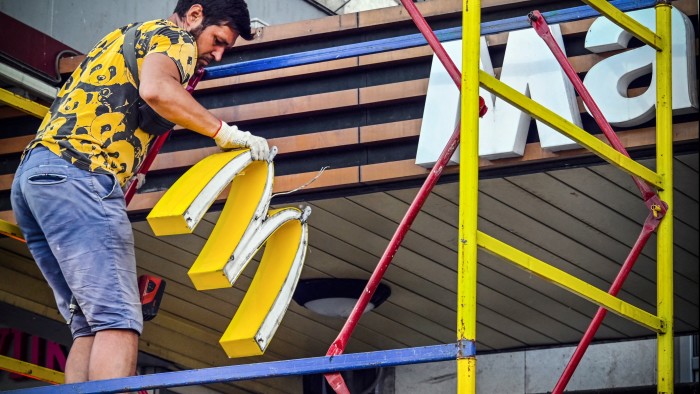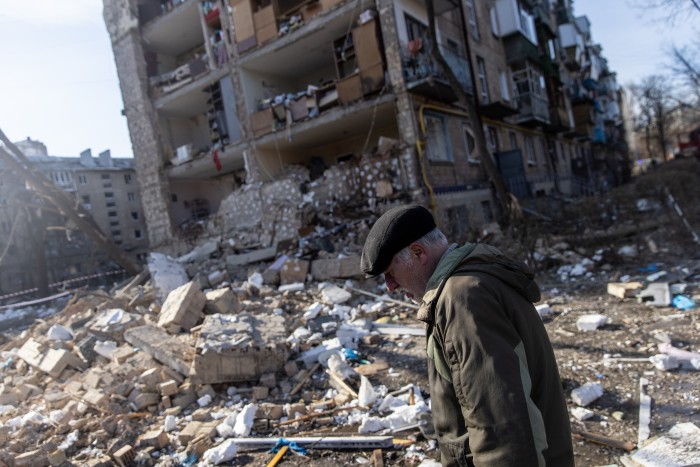Divestment dilemmas in Russia: business teaching case

Roula Khalaf, Editor of the FT, selects her favourite stories in this weekly newsletter.
After Russia invaded Ukraine in February 2022, some companies swiftly curtailed operations in Moscow. Big groups including Siemens, McDonald’s and Starbucks withdrew. A wave of corporate promises to divest from Russia followed. Not all companies have delivered on those promises.
The Chief Executive Leadership Institute (CELI) at Yale School of Management has been tracking how more than 1,600 companies with ties to Russia have reacted to the armed conflict.
By April this year, a third had halted engagement or completely exited; a third temporarily curtailed operations but retained return options; and 15 per cent continued business as usual.
These mixed responses show that many companies still struggle to decide whether, when and how to exit the Russian market.
For some, the decision is easy, because their exposure is limited. Others, such as Austria’s Raiffeisen Bank International, which has operated in Russia since 1989, rely heavily on their Russian operations and are still operating in the country, though as of April it was reportedly in talks with potential suitors over the sale of its Russian arm.
Many western businesses struggle to sell assets because of new rules making divestment more difficult and costly. In December 2022, the Kremlin required companies wanting to leave to have assets valued by the government and to sell at a 50 per cent discount. In many sectors, there are only a few, if any, buyers, since many are under western government sanctions.

Tobacco group Philip Morris admitted that it would “rather keep” its Russian business than sell on the Kremlin’s terms. Chief executive Jacek Olczak pointed to his duty to shareholders to protect $2.5bn in assets. Other companies face similar problems: Carlsberg, which joined Heineken in quitting Russia, also had difficulties in finding a buyer.
Background
Discussion about whether to divest is heated. Those in favour say companies remaining in Russia pay taxes to a repressive regime and fill Putin’s war chest. In doing so, they create a paradox: while many western governments support Ukraine with bilateral aid, remaining companies indirectly support Russia’s war. A global coalition of civil society organisations, B4Ukraine, estimates that companies choosing to remain could pay about $18bn in taxes.
Others have argued that companies’ societal licence to operate anywhere is diminished if they stay on in Russia. If businesses do not pull out, they give legitimacy to the regime and indirectly tolerate a one-sided war.

On February 23 2023, 141 countries voted for a UN General Assembly resolution to end the war, 32 abstained and only seven voted against. The broad condemnation of the invasion puts moral pressure on companies to leave. Doing business in Russia carries reputational risks, as it can give the impression that a company ignores human suffering.
Some businesses were directly hit by government sanctions. Siemens, for instance, referred to “comprehensive international sanctions” and their effects on rail services and maintenance as one reason to withdraw from Russia.
While many companies in the “leave” camp highlighted moral obligations or political necessities, others made economic calculations. With a rapid resolution unlikely, these companies face exponential risks in a country targeted with significant sanctions. In many cases, supply chains are disrupted and resources unavailable.
An analysis by Yale academics of the joint effects of government sanctions and business divestment decisions concluded (and is titled) “Business retreats and sanctions are crippling the Russian economy” — for instance, because Russia cannot find substitutes for some products it is now unable to import.
The economic risk argument has been substantiated by an analysis, “Divesting under pressure”, by Tetyana Balyuk and Anastassia Fedyk, which showed companies with the worst stock-price reactions to the war were more likely to subsequently exit Russia. Those that experienced only mild effects were more likely to remain.

Some businesses argue they should stay in Russia, at least if the conflict does not escalate further. They stress a social responsibility towards local employees, particularly with the Russian economy hit hard. One assumption behind this argument is that the Russian people are not responsible for the war and government actions.
Companies in the “remain” camp also highlight that selling assets at heavily discounted rates is a gift to Putin’s regime, especially if bought by oligarchs close to the Kremlin. The French bank Société Générale sold its Russian business to Vladimir Potanin, who served as deputy prime minister under Boris Yeltsin and maintains ties with Putin.
Other businesses stress that they provide essential goods such as medicine or basic food items. Food company Cargill declared: “Food is a basic human right and should never be used as a weapon.” Some critics argue that Russia is violating this human right by stealing Ukrainian grain and destroying storage facilities. Others point out that Russia is a large producer of food and can secure basic items without western help. Pharmaceutical and agricultural firms are among the slowest to leave, with more than four-fifths continuing to do business in Russia.
For businesses that remain, there is then the question of where to draw the line. Should they stay in Russia regardless of how the conflict develops? The chief executive of Danish insulation material producer Rockwool said his “red lines” included a full-blown escalation of the war with direct Nato involvement, or a nuclear attack.
To consider
What do you think about the dilemmas of divestment? Read these FT articles, then explore the background and consider the points below:
• Companies trying to exit Russia have to ’dance with the devil’
• Tobacco Group Philip Morris admits it may never sell its Russian business
• More FT background articles at ft.com/russia-business-finance
Here are some questions to consider and guide discussion:
1. Should all companies divest from the Russian market?
a) Should companies leave Russia even if they face heavy economic losses? Some senior executives refer to their duty to shareholders to justify not selling assets at a significant loss.
b) Should companies that provide medicine and basic food items remain in Russia on humanitarian grounds? Some suggest they could instead donate products to the UN or the Red Cross to distribute.
c) Some companies have said they will donate all profits generated by Russian subsidiaries to humanitarian causes to justify continued operations in the country. Will such an approach find public acceptance?
d) Where should companies still operating in Russia draw a “red line” on when to exit?
2. Should companies keep a “back door” open to return to Russia once the armed conflict is over? Several, such as the brewer Carlsberg, aim to insert buyback clauses into contracts when selling Russian assets. This might be considered good strategic foresight, or a lack of seriousness when exiting the Russian market.
3. What does the fact that many companies find it hard to leave Russia tell us about the ability of corporations to assume social responsibility?
Andreas Rasche is professor of business in society at the Centre for Sustainability of Copenhagen Business School (CBS), and associate dean for the CBS full-time MBA programme
Comments